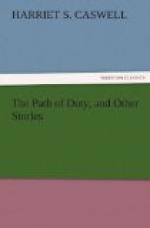“Oh, yes,” replied the boy, “I’ve
been clean through ’Webster’s Elementary
and the Progressive Reader.’” “Can
you tell me the subject of any of your lessons?”
“I can just remember one story about a dog that
was crossing a river on a plank with a piece of meat
in his mouth, and when he saw his shadder in the water,
made a spring at it and dropped the meat which he held
in his mouth, and it was at once carried away by the
current.” “Well,” said the
teacher, “as you remember the story so well,
you can perhaps tell me what lesson we can learn from
this fable.” “I thought,” replied
the boy, “when I read the story, that the best
way is to hold on to what we are sure of, and not
grab after a shadder and lose the whole.”
“Your idea is certainly a correct one,”
said the master, “and now we will turn to some
other branch of study; can you cipher?” “Don’t
know, I never tried,” replied the boy, with
the greatest coolness imaginable. “Well,”
replied the teacher, “we will after a time see
how you succeed, when you do try. Can
you tell me what the study of Geography teaches us!”
“O,” said the boy, “geography tells
all about the world, the folks who live in it, and
’most every thing else.” The master
then asked him some questions regarding the divisions
of land and water, and for a short time he answered
with some degree of correctness. At length, while
referring to the divisions of water, the master said
“can you tell me what is a strait?” This
question seemed a “puzzler” to him, and
for some moments he looked down as if studying the
matter; when the question was repeated in rather a
sharp tone, it seemed he thought it wiser to give an
answer of some kind than none at all, and he replied:
“When a river runs in a straight course, we
call it straight, and when it twists and winds about,
we call it crooked.” “A river is not
a strait,” replied the teacher with the manner
of one who prayed for patience. “Well! at
any rate,” said the boy, “straight is
straight, and crooked is crooked, and that is all
I know about it.” It was evident from the
teacher’s manner that he was half inclined to
think the boy was endeavoring to impose upon him by
feigning ignorance; and he dismissed him to his seat
for the time being, thinking, no doubt, that he had
met with a case out of the common order of school
experience. It seems that the boy had never before
attended school with punctuality, and it required a
long time to teach him to observe anything like system
either in his conduct or studies. Our teacher
though very firm, was mild and judicious in his government;
and, thinking that possibly Ned’s disposition
had been injured by former harshness at school, resolved
to avoid inflicting corporal punishment as long as
possible; and try upon him the effect of kindness
and mild persuasion. He had one very annoying
habit, and that was he would very seldom give a satisfactory
answer if suddenly asked a direct question, and often
his reply would be very absurd, sometimes bordering




